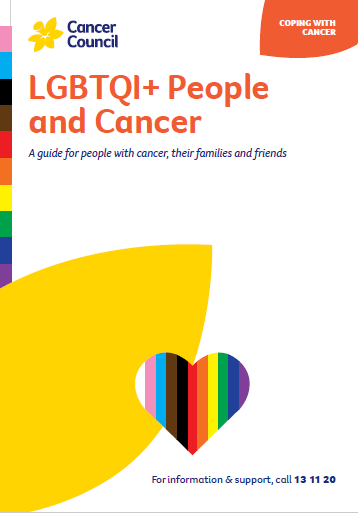- Home
- About Cancer
- LGBTQI+ People and Cancer
- Key questions
- How to spot an LGBTQI+ friendly service
How to spot an LGBTQI+ friendly service
Look for signs of inclusionThese can include LGBTQI+ flags, rainbow ticks, posters and photos or statements about the service’s commitment to LGBTQI+ communities. You may find these on the service’s website or in their window or waiting rooms. | |
Find out about their experience and policiesCall or email the service to ask if they regularly see LGBTQI+ people and have an anti-discrimination policy. You could ask if any of their staff are LGBTQI+. It may be easier for a friend or family member to ask these questions. | |
Ask for recommendationsYour friends may know of services that are LGBTQI+ friendly. Ask what they liked and didn’t like. If you have an LGBTQI+ friendly GP, ask them to refer you to a supportive cancer specialist. | |
Use DocDir websiteThis website lists doctors and mental health professionals who are welcoming and safe for LGBTQI+ communities, and knowledgeable about their unique health needs and concerns. | |
Check forms and websiteBefore your appointment, check whether intake forms ask about sexual orientation, gender and intersex variations, and pronouns. Check the website for inclusive language and details about training or accreditation. | |
Trust your judgementSometimes you might just have a feeling about whether a health professional or service will be right for you. It’s okay to trust your instincts. |
For more on this, see Emotions and Cancer.
It’s great that clinics, doctors, surgeons and so on actually have ways of displaying their friendliness and openness such as the gay flag on the front door. We need to see visual signs to give us that comfort.
RODNEY (GAY MAN, SKIN CANCER)
→ READ MORE: Coping with cancer
Podcast for people affected by cancer
Listen now
We thank the chief investigators from the Out with Cancer research project: Prof Jane Ussher, Prof Janette Perz, Prof Martha Hickey, Prof Suzanne Chambers, Prof Gary Dowsett, Prof Ian Davis, Prof Katherine Boydell, Prof Kerry Robinson and Dr Chloe Parton. Partner investigators were Dr Fiona McDonald and A/Prof Antoinette Anazodo. Research Associates were Dr Rosalie Power, Dr Kimberley Allison and Dr Alexandra J. Hawkey.
We thank the reviewers of our LGBTQI+ People and Cancer booklet: Prof Jane Ussher, Chair, Women’s Heath Psychology and Chief Investigator, Out with Cancer study, Western Sydney University, NSW; ACON; Dr Kimberley Allison, Out with Cancer study, Western Sydney University, NSW; Dr Katherine Allsopp, Supportive and Palliative Care Specialist, Westmead Hospital, NSW; A/Prof Antoinette Anazodo OAM, Paediatric and Adolescent Oncologist, Sydney Children’s Hospital, NSW; Megan Bathgate, Consumer; Gregory Bock, Clinical Nurse Consultant–Oncology Coordinator, Urology Cancer Nurse Coordination Service, WA Cancer & Palliative Care Network, WA; Morgan Carpenter, Executive Director, Intersex Human Rights Australia (formerly OII Australia); Prof Lorraine Chantrill, Medical Co-Director Cancer Services, Illawarra Shoalhaven Local Health District, NSW; A/Prof Ada Cheung, Endocrinologist, Head, Trans Health Research Group, Department of Medicine (Austin Health), The University of Melbourne, VIC; Bonney Corbin, Australian Women’s Health Network; Cristyn Davies, Research Fellow, Specialty of Child and Adolescent Health, Faculty of Medicine and Health, The University of Sydney and Children’s Hospital Westmead Clinical School, NSW; Prof Ian Davis, Professor of Medicine, Monash University and Eastern Health, Medical Oncologist, Eastern Health, Chair, ANZUP Cancer Trials Group, VIC; Rebecca Dominguez, President, Bisexual Alliance Victoria; Liz Duck-Chong, Projects Coordinator, TransHub and Trans Health Equity, ACON, NSW; Lauren Giordano, 13 11 20 Consultant, Cancer Council NSW; Hall & Wilcox (law firm); Natalie Halse, BCNA Consumer Representative; Jem Hensley, Consumer; Prof Martha Hickey, Professor of Obstetrics and Gynaecology, The University of Melbourne, and Director of the Gynaecology Research Centre, The Women’s Hospital, VIC; Kim Hobbs, Clinical Specialist Social Worker – Gynaecological Cancer, Westmead Hospital, NSW; Dr Laura Kirsten, Principal Clinical Psychologist, Nepean Cancer Care Centre, NSW; Amber Loomis, Policy and Research Coordinator, LGBTIQ+ Health Australia; Julie McCrossin and Melissa Gibson, Consumers; Dr Fiona McDonald, Research Manager, Canteen, NSW; Dr Gary Morrison, Shine a Light (LGBTQIA+ Cancer Support Group); Penelope Murphy, Cancer Council NSW Liaison, Prince of Wales Hospital, NSW; Dr Rosalie Power, Out with Cancer study, Western Sydney University, NSW; Jan Priaulx, 13 11 20 Consultant, Cancer Council NSW; Paul Scott-Williams, Consumer; Simone Sheridan, Sexual Health Nurse Consultant, Sexual Health Services, Austin Health, VIC; Cheryl Waller and Rhonda Beach, Consumers.
View the Cancer Council NSW editorial policy.
View all publications or call 13 11 20 for free printed copies.
Need to talk?
Support services
Coping with cancer?
Speak to a health professional or to someone who has been there, or find a support group or forum
Need legal and financial assistance?
Pro bono services, financial and legal assistance, and no interest loans
Cancer information
Dealing with the diagnosis
Common reactions to a cancer diagnosis and how to find hope
Explore our resource hub
Explore and download our booklets, fact sheets, podcasts, webinars and videos for people affected by cancer
